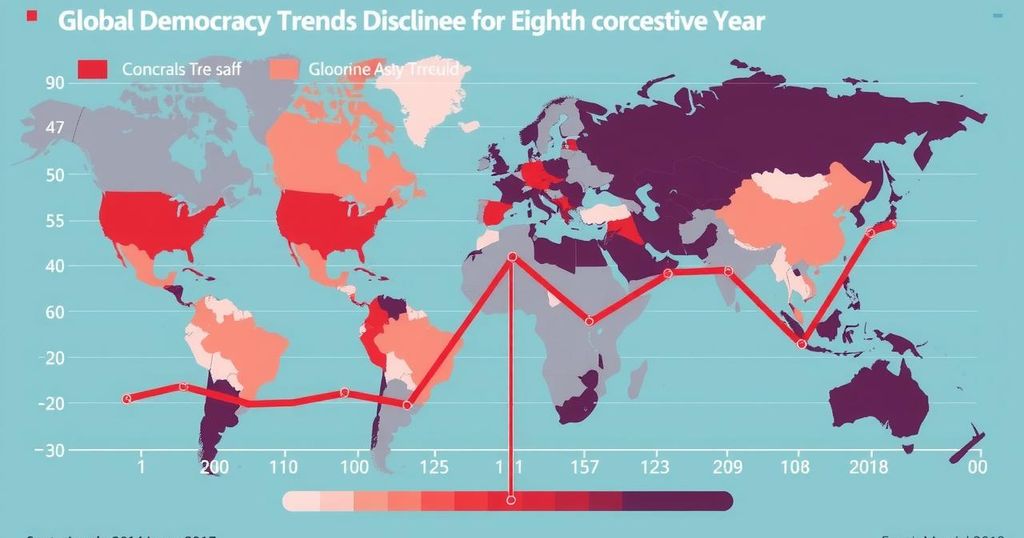Global Democratic Backsliding: An Analysis by International IDEA

The International IDEA has reported an alarming eight-year decline in democracy globally, underscored by an increase in disputed elections, a steep drop in voter turnout from 65.2% in 2008 to 55.5% in 2023, and widespread challenges to election legitimacy due to governmental, foreign, and technological interference. The findings reveal substantial risks to democratic integrity, emphasizing the critical need for credible elections to reverse this trend.
In a profound assessment of global democracy, the International Institute for Democracy and Electoral Assistance (International IDEA) reported that the year witnessed the steepest decline in credible elections and parliamentary oversight in nearly fifty years. This deterioration is attributed to several factors including governmental intimidation, foreign meddling, disinformation campaigns, and the manipulation of artificial intelligence in political processes. Alarmingly, the organization revealed that one-third of elections encountered disputes, significantly compromising their legitimacy. Furthermore, voter participation plummeted from 65.2% in 2008 to a mere 55.5% in 2023.
International IDEA’s Global Report on the State of Democracy analyzed democratic metrics across 158 nations, revealing that nearly half of these nations have experienced a downturn in fundamental democratic indicators over the last five years. Specifically, 2023 marked the worst year for free and fair elections and parliamentary oversight. The report highlighted that foreign interference and the use of AI are prevalent issues that have exacerbated the situation on a global scale.
Democratic backsliding remained consistent across various regions. While Africa showed relative stability, countries such as Burkina Faso have witnessed notable declines due to military coups. In Western Asia, over one-third of nations reported poor democratic performance. Europe has also seen significant regressions in rule of law and civil liberties, despite some improvements in nations like Montenegro. Although the Americas exhibited overall stability, countries such as Guatemala and Peru experienced notable declines, particularly in regard to the rule of law.
Meanwhile, the Asia-Pacific region may have displayed minor declines; nevertheless, significant regressions occurred in Afghanistan and Myanmar due to their political turmoil. As a closing remark, International IDEA’s Secretary-General emphasized the crucial role of elections in curbing democratic erosion.
The state of democracy worldwide has faced significant challenges in recent years, particularly with growing incidences of election disputes and decreasing voter turnout. The report published by the International Institute for Democracy and Electoral Assistance provides insight into the various factors contributing to this decline, including foreign influence and the advent of technology in electoral processes. The research underscores the importance of credible elections in maintaining democratic stability.
In conclusion, the consistent decline in democratic practices globally over the past eight years highlights a troubling trend characterized by increased election disputes, diminished voter engagement, and overarching threats to election integrity. The findings advocate for the protection of electoral processes as a vital mechanism to reverse the current trajectory of democratic decay. As emphasized by the Secretary-General of International IDEA, without the assurance of credible elections, the prospects for democracy remain precariously dim.
Original Source: apnews.com







